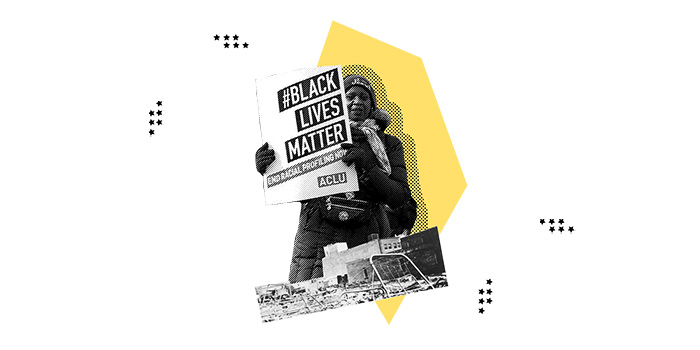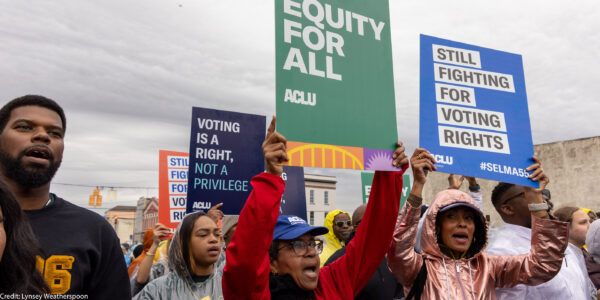Why the Fight for Racial Justice is a Human Rights Issue


On this day 76 years ago, the United Nations General Assembly adopted the Universal Declaration of Human Rights (UDHR), subsequently marking December 10th as International Human Rights Day. But nearly eight decades later, historically marginalized communities across the U.S. – particularly people of African descent – are still fighting for their very lives, for basic human dignity, and for full participation in civic life.
Last week, the United Nations Working Group of Experts on People of African Descent concluded its 35th session to examine the issues, contexts, and challenges affecting the pursuit of reparatory justice for Africans and people of African descent. On this International Human Rights Day, with the incoming Trump administration’s anticipated human rights violations looming on the horizon, now more than ever is it critical to concretize policies geared toward racial and reparatory justice – before any human rights rollbacks occur.
Failed Reparations Worsen Slavery's Legacy
The U.S. led efforts to create the UN human rights system after World War II, including drafting the UDHR, but the country has struggled to follow through with its commitments. In the last seven decades, the U.S. has undermined the UDHR’s impact and failed to fully adopt human rights as a part of its domestic laws and policies; neglecting its obligations at home and abroad in a principled and consistent way.
One significant area the U.S. has been criticized for failing to fulfill its human rights obligations is on racial and reparatory justice for Black diasporic communities, especially by hindering progress on forming a commission to study the system of enslavement. During enslavement, Black people were forced to labor for the enrichment of the burgeoning U.S. After slavery was abolished, Jim Crow laws, Black Codes in the South, and de facto segregation inflicted violent exploitation and repression on a so-called emancipated populace. Slavery’s legacy meant many African Americans faced the physical and psychological consequences of state-sanctioned violence, including widespread lynchings and targeted massacres. These crimes and injustices were part of a pervasive campaign of deliberate terror and oppression inflicted upon Black diasporic communities in the U.S.
In 1989, the late Congressman John Conyers of Michigan originally introduced H.R. 40 to establish a commission dedicated to studying and developing reparations proposals, including addressing the government’s reneged promise of providing every newly-freed person with a mule and 40 acres of land during Reconstruction. Congress opposed the bill for nearly three decades, but the late Congresswoman Sheila Jackson Lee of Texas reintroduced H.R. 40 in 2021 and again in January 2023. Subsequently, Congresswoman Cori Bush of Missouri introduced a resolution in May 2023 in support of H.R. 40 to forcefully assert why the U.S. government has a responsibility to provide reparations to descendants of enslaved Africans.
Though several attempts to codify H.R. 40 have gained traction in Congress, the bill has never been considered before the full House of Representatives and continues to die in-chamber. Furthermore, despite President Joe Biden’s commitment to racial equity and engagement with several human rights bodies that have raised the issue, he, too, has failed to create a presidential commission on the study of reparations. These continued efforts to delay legislative progress toward reparatory justice, combined with decades-long inaction from Congress to pursue the study of reparations, deepen the nation’s failure to confront its past of anti-black violence and perpetuate the federal government’s evasion of responsibility for the legacies of enslavement and racial terror.
Anti-CRT Laws Set Back Racial Justice Efforts
In addition to stalled federal attempts to achieve reparatory justice, there has been an alarming movement to restrict instruction in Critical Race Theory (CRT), including the impact of enslavement and failed reparations for Black and brown people. Notably, since 2023, 86 bills targeting CRT and other initiatives aimed to promote diversity, equity, inclusion, and belonging (DEIB) were introduced in 28 states, 14 of which became law. In 2024 alone, more than 60 anti-CRT measures were introduced in 21 states and at the federal level, with another 35 bills regarding other DEIB measures also introduced.
Efforts to limit or eliminate CRT in schools are linked to the movement for reparatory justice. When one is censored, the other becomes virtually impossible to attain. Reparatory justice relies on preserving, honoring, and sharing the memories of those who suffered under nationwide racial oppression. When governmental officials suppress or outrightly ban discussions of African American studies, this forced historical amnesia hinders any effort to foster truth, justice, and accountability, just as the reparations movement seeks to obtain. To restrict and blatantly deny this history is to diminish any likelihood of advancing reparatory justice for African American diasporic communities.
Why Reparations Are Needed Now More than Ever
Reparations can take several different forms, including financial redress, a formal apology from government bodies, or the right to learn accurate information about enslavement. However, mounting challenges to the racial justice and human rights movements only make the pursuit of reparatory justice more arduous. Considering how intricately social and economic injustices are linked, reparations are a start to both amending the nation’s egregious past while paving a course for a more equitable future.
American Civil Liberties Union affiliates are involved at the local and state levels to promote reparatory justice. In July 2023, the ACLU of Northern California released their public report on reparations to the California legislature, detailing the history of enslavement in California and continued impact of anti-Black policies against African American diasporic communities. Similarly, in New York, the New York Civil Liberties Union recently supported the New York City Council’s efforts to create a commission for the purpose of studying the continued legacy of enslavement and the feasibility of reparations. The ACLU of Louisiana also advocated for reparatory justice, including partnering with the Fund for Guaranteed Income to create the Truth and Reconciliation Project in 2022, with the goal of transferring economic power from the descendants of enslavers to those impacted by the oppressive vestiges of slavery across the American South.
The movement for reparatory justice is not about blame, but one step toward repairing centuries of harm inflicted on an entire populace. Right now, we must acknowledge the connection between the past and present and commit to a new path as a nation.
As the country prepares for the onslaught of civil liberties and civil rights abuses that the Donald Trump administration and Project 2025 have promised, we must be clear on what justice looks like for all Americans. It is not enough to safeguard the most basic rights owed to all Americans: we must advocate for reparatory justice so that we can finally reckon with our abysmal racial history. An America for all is one where African American diasporic culture, studies, and communities are finally protected.
Donate to the ACLU
The ACLU has been at the center of nearly every major civil liberties battle in the U.S. for more than 100 years. This vital work depends on the support of ACLU members in all 50 states and beyond.
We need you with us to keep fighting — donate today.
Contributions to the ACLU are not tax deductible.



